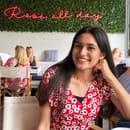I have always held an appreciation for Pakistani culture, and my yearly visits have shown me that it is a country that holds a sense of beauty despite the stereotypes portrayed in the media. Driving around the city, I can find buses adorned with the most vibrant, colorful patterns and bells hanging from them, which easily puts the ordinary bus to shame. The food is rich with spice to the point where I’m in tears, and the endless variety of desserts guarantees a visit to the dentist. One of the most beautiful parts of Pakistan is when the Azan, the Islamic call to prayer, echoes throughout the city on speakers, which casts a sense of tranquility over the city as people pause from the hustle-and-bustle of their daily activities to connect with God.
Growing up as a daughter of immigrant parents, I was often unhappy that I was not given the experience of growing up in my parents’ homeland of Pakistan. I felt different because my childhood included American customs, learning about US history, and an environment that was different from what my parents and extended family grew up in. For the longest time, I merely could not understand why my parents dared to leave behind a comfortable life of familiarity and their family in favor of providing a new life of opportunity for their children. What opportunity was I being given when children in elementary school stared at my Henna, said the word “Pakistan” incorrectly, or threw a whole bunch of misconceptions my way that didn’t even make sense? Even when I visited Pakistan, despite loving the culture, my Urdu wasn’t nearly as fluent as a native speaker, I only knew so much about the country itself, and I was referred to as the “relative from America” when meeting new people, making it appear as though I was an outsider from my own people. I was too brown for Americans, but too white for Pakistanis. Where did I fit in?
However, as I grew older, I came to realize that the environment I grew up in greatly affected my identity and shaped me into who I am today. Being in a country with no dominant religion or ethnic group made topics such as abortion and women’s rights, same-sex marriage, and racism something I was more exposed to and aware of. I have witnessed instances of human rights violations and immigration bans that have forced me to identify what I stand for and how I can make a difference for others around me, which is something I wouldn’t necessarily be exposed to otherwise. The diversity in the United States exposes me to people of various backgrounds from which I became open-minded and accepting of different people and customs, which is something I may not have been confronted with in a country where nearly everyone was the same.
I have even been able to become friends with other Pakistani-Americans who are experiencing the same journey as I am, and together we immerse ourselves in Pakistani culture thousands of miles away, whether it be participating in cultural dances at weddings, discussing cricket matches, or trying to find spicy food that just might come close to the actual thing. I’ve learned to celebrate both aspects of my identity that matter to me – my upbringing in America along with my Pakistani background.
When I visit Pakistan and see that everyone looks like me, it feels warm. Nobody gives me a second glance or mispronounces my name or native country because we are all the same. I won’t lie to you – it feels nice to blend in. But in the end of the day, I owe it to my upbringing in America that cultivated my personality. This upbringing heightened my sense of awareness about issues that are considered taboo and forbidden from being discussed in many countries. This upbringing allowed me to interact with people of different backgrounds who have become some of my closest friends, who I otherwise would never have met had I only grown up with people just like me.
All that’s left for me to say is to thank my parents for sacrificing so much to provide the life they envisioned for me and giving me the resources to grow into someone who can make them proud.


